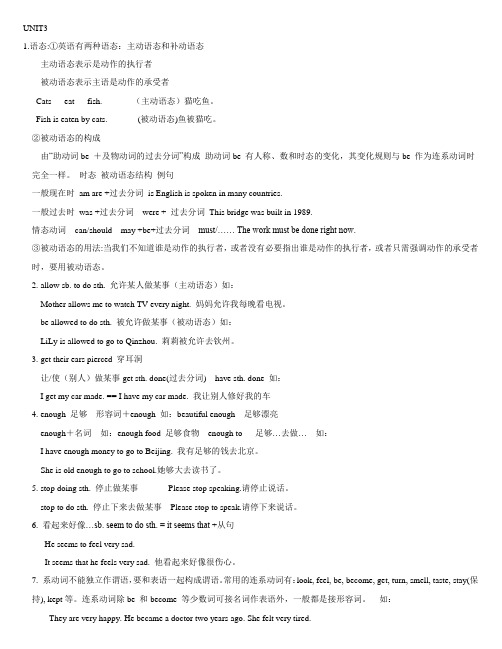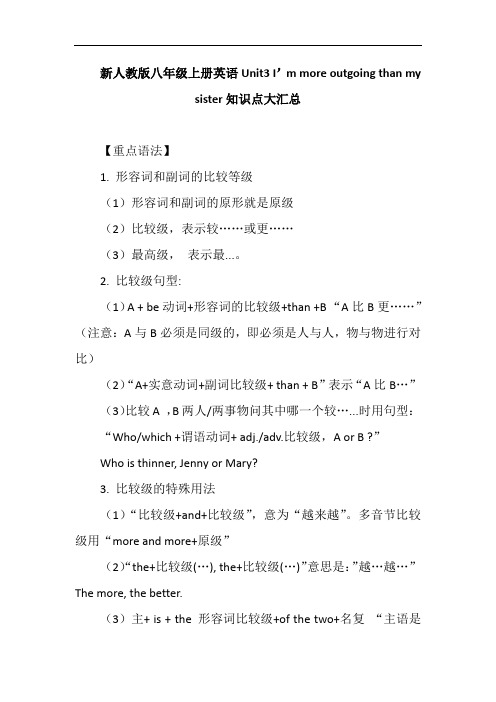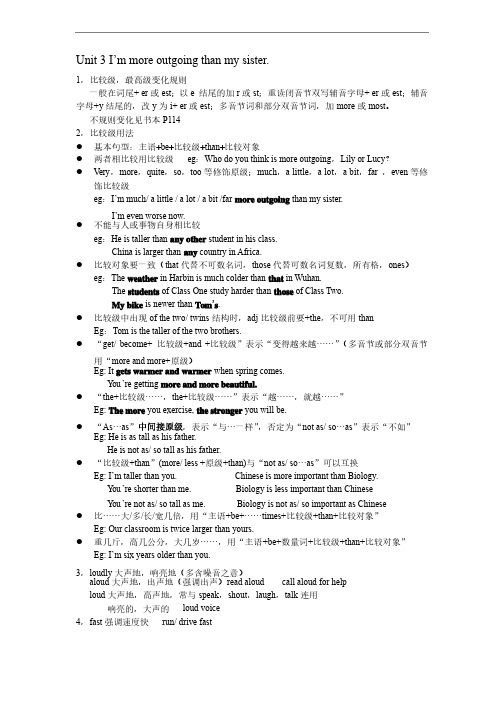新版人教版八年级上英语3-4单元的知识点
八年级上册英语第三单元、四单元复习知识点

八年级上册Unit 3 topic 3Section A1. Hold the line, please.Hold the line = hold on = wait a moment = just a moment 为打电话用语,意为“等一会”2. nobody = not…anybody;如:There is nobody in the room. = There is not anybody in the room. no = not…any如:I have no friends. = I don’t have any friends.3. take a shower = have a shower洗淋浴take a bath= have a bath 洗澡Section B1. watch a movie/ film = see a movie/ film 看电影; go to the cinema/ movie theater 去电影院2. agree 的用法:(1) agree with 后常接人或what引导的从句,表同意某人,如:①I agree with you. ②I agree with what you said.(2) agree to sth.,表“同意某事”,接表示建议、计划、条件、安排等的词。
如:I agree to the plan.(3) agree to do sth 表“同意去做某事”,如:I agree to help you.(4) agree on/ about sth. 关于某事方面表示同意,如:I agree on the matter.(5) agree + that从句,如:They agreed that I should buy the book.3. He is handsome.handsome 英俊的(常指男士),beautiful 漂亮的(常指女士)4. You look so sad.sad 悲伤的,难过的;sadly 副词;sadness 悲伤(名词)5. Because I made faces and made my classmates laugh when she was giving us a lesson.make faces= make a face 做鬼脸give sb. a lesson/ lessons 给某人上课Section C1. in the early 1800s, Sunday was the “holy day”.表“世纪或年代”用“in + the +(年数s)”如:In the 1800s 在19世纪;in the 1960s 在20世纪60年代;(注意:要用the, 年数后加s,而表示具体的某一年不用the, 也不加s, 如:in 2009 )2. 短语比较:solve the problem 解决难题;answer the question 回答问题3. At one o’clock everyone stopped working.stop doing sth. 停止正在做的事情;stop to do sth.= stop doing A to do B 停下来去做另件事类似的有:go on dong sth. 继续做某事(同件事);go on to do sth. 接着去做某事(另件事)4. This is the beginning of the idea of the weekend in England.the beginning of 表“…的开始”at the beginning of 表“在…的开始”如:at the beginning of the month 在月初Section D 短语:talk about 谈论talk with/to 与某人交谈八年级上册Unit 4 topic 1Section A1. 名词复数特殊的几种:(1)单复数同形的名词有:fish鱼,deer鹿,sheep绵羊,Chinese中国人; Japanese (2)不规则变化:child---children;foot---feet,tooth---teeth牙齿;goose---geese 鹅mouse---mice老鼠;man---men;woman---women注意:与man 和woman构成的合成词,其复数形式也是-men 和-women。
八年级上册英语unit3-4知识点汇总(20xx人教版)

八年级上册英语unit3-4知识点汇总(20xx人教版)unit3重点讲解1.“看起来”两不“像”:look like, look the sameas you can see, in some ways we look the same, andin some ways we look different.就像你看到的那样,在某些方面我们看起来一样,在某些方面我们看上去不同。
look like, look the same都可以表示“看起来像”之意。
〔1〕look like是由“不及物动词look+介词like”构成的动词词组,后面需接一个宾语。
假设表示“某人〔物〕非常相像”可用very much修饰。
lily looks like your younger sister very much. 莉莉看上去很像你妹妹。
〔2〕look the same是一个固定词组,表示主语所包含的两个或两个以上的事物看起来一样,主语必须是复数,其动词look不行能出现looks形式。
look the same后面不再接其他成分,也不能用very much修饰。
are you twins? you look the same. 你们是双胞胎吗?你们看起来一样。
【练习】〔1〕lucy looks _______her mother.a: same b: the same c: as d: like〔2〕although they are sisters, they don't _______________ ________〔看起来一样〕.2.all, both“都”不同we both have black eyes...我们都有黑色的眼睛......〔p33〕both 与all的用法相像。
both强调两者都,而all那么强调三者或三者以上都。
both可用作形容词、代词和副词,其用法如下:词条区分例句代词“两者,双方,两人”,与of连用both of them are teachers.他们两都是教师。
(完整版)人教版八年级上册Unit3-4单元知识点总结(可编辑修改word版)

少数以-er,-ow 结尾的双音节词末尾加-er,-estclever(聪明的)cleverer cleverest其他双音节词和多音节词,在前面加more,most 来构成比较级和最高级narrow(窄的)important(重要的)easily(容易地)narrowermore importantmore easilynarrowestmost importantmost easily不规则变化:6)有少数形容词、副词的比较级和最高级是不规则的,必须熟记。
列表如下:原级good 好的well 好;(身体)好的, bad,badly 糟糕的,糟糕地ill(身体)不舒服的many 许多的(可数)much 许多的(不可数);非常little 少的far 远的;远地old 老的比较级better 更好的worse 更糟糕的,更糟糕地;(身体)更不舒服的more 更多的;更less 更少的farther 更远的;更远地further 进一步的(地)older 年龄较大的;较旧的elder 仅表兄弟姊妹之间的长幼最高级best 最好的worst 最糟糕的,最糟糕地;(身体)最不舒服的most 最多的;最least 最少的farthest 最远的;最远地furthest 最深刻的(地)oldest 年龄最大的;最旧的eldest 仅表兄弟姊妹之间的长幼形容词最高级的用法1.形容词的最高级用于三者或三者以上的人或事物的比较,其中有一个在某一方面超过其他几个。
如:Monday is the busiest day for us. 对我们来说,星期一是最忙碌的日子。
Judy runs most quickly of the four girls. 在四个女孩中,朱迪跑得最快。
2.使用形容词最高级时,句中往往会出现由in 或of 构成的介词短语,用以说明范围。
in 表示在某一范围内,of 表示属性,意为“某一类中的”。
人教初二 上册3,4 单元知识点总结

13. 曾经做某事: Do you ever get to school late? Yes, I do. No, I don’t. Have you ever got to school late? Yes, I have. No, I haven’t. 14. go shopping(去购物), go fishing(去钓鱼), go swimming(去游泳), go boating(去划船), go hiking(去登山), go trekking(去徒步) 15. be strict with sb. 对某人严厉 如: Mother is strict with her son. 妈妈对她的儿子很严厉。 16. take the test 参加考试 pass the test 通过考试 fail a test 考试失败 17. the other day 前几天 18. agree 同意 反义词 disagree 不同意 动词 agreement 同意 反义词 disagreement 不同意 名词
8. 倒装句: 由 so+助动词(be/do/will/have)/情态动词+主语 意为:…也是一样 She is a student. So am I. 她是一个学生,我也是。
She went to school just now. So did I . 她刚才去学校了,我也是 She has finished the work. So have I . 她已经完成了工作,我也完成了。 She will go to school. So will he. 她将去学校,他也是。 9. yet 仍然,还 常用在否定句或疑问句当中 10. stay up 熬夜如:I often stay up until 12:00pm.我经常熬夜到 12 点。 11. clean up 打扫 整理 如: I have cleaned up the bedroom. 我已经打扫完了卧室。 12. 程度副词:always 总是 usually 经常 sometimes 有时 never 从不 如:I am always/usually/sometimes/never late for school. 我总是/经常/有时/从不上学迟到。
新人教版八年级上册英语第三和第四单元知识点大汇总

新人教版八年级上册英语Unit3 I’m more outgoing than mysister知识点大汇总【重点语法】1. 形容词和副词的比较等级(1)形容词和副词的原形就是原级(2)比较级,表示较……或更……(3)最高级,表示最...。
2. 比较级句型:(1)A + be动词+形容词的比较级+than +B “A比B更……”(注意:A与B必须是同级的,即必须是人与人,物与物进行对比)(2)“A+实意动词+副词比较级+ than + B”表示“A比B…”(3)比较A ,B两人/两事物问其中哪一个较…...时用句型:“Who/which +谓语动词+ adj./adv.比较级,A or B ?”Who is thinner, Jenny or Mary?3. 比较级的特殊用法(1)“比较级+and+比较级”,意为“越来越”。
多音节比较级用“more and more+原级”(2)“the+比较级(…), the+比较级(…)”意思是:”越…越…”The more, the better.(3)主+ is + the 形容词比较级+of the two+名复“主语是两者中较......的”4. 两者在某一方面相同:A+谓语动词/be动词+as+ adj./adv.原级+ as+ B.Helen is as tall as Amy.Peter studies as hard as Tom.表示两者在某一方面不及另一方时,用“not as/so+形容词或副词原级+as”I am not as tall as my sister.5. 形容词,副词比较级前的修饰语。
当需要表示一方超过另一方的程度时,可以用much, a lot, a little, a bit, 等来修饰形容词比较级。
注意: 比较级不能用very, so, too, quite等修饰。
【重点短语】1. more outgoing 更外向/更开朗2. as...as...与……一样3. the singing competition 歌咏比赛4. the most important 最重要的5. be talented in music 在音乐方面有天赋6. the same as 与……相同7. care about 关心/留意/关注8. be different from 与…...不同9. be like a mirror 像一面镜子10. as long as 只要;与…...一样长11. bring out 显示/显出12. get better grades 取得更好的成绩13. reach for 伸手达到/达到14. touch one’s heart 感动15. in fact 事实上16. make friends 交朋友17. be good at 在某方面成绩好18. the other 另一个19. be similar to 与…相似20. be good with 与…和睦相处21. have fun=Have a good time 玩得开心have fun doing sth 做某事很开心22. do the same things as me. 做和我一样的事情23. It’s+adj+(for sb.)to do sth. “做某事(对某人来说)是...的”24 make friends with sb. 与某人交朋友25. as long as 只要;既然,引导条件状语从句【词语辨析】1. be good at=do well in ,其后可接名词、代词或动名词,表示擅长......2. care about 关心care for 关爱take care (当/小心)take care of (照顾)=look after3. make sb. do sth. :让(使)某人做某事(make后跟不带to 的不定式)His father always make me get up before five o'clock.make sb. +形容词:使某人保持某种状态My friends always make me happy.4. be like“就像…”I am like your sister.look like “外貌上的像”I look like my sister.5. That’s why+句子:那就是…的原因/那就是为什么…That's why I study English hard. 那就是我努力学习英语的原因。
最全面人教版八年级上册英语第三单元知识点归纳总结

最全面人教版八年级上册英语第三单元知识点归纳总结第三单元主要介绍了八年级上册英语中的一些重要知识点。
本文将对这些知识点进行归纳总结,以帮助同学们更好地理解和掌握。
一、重点词汇1. soccer(n.):足球2. ping-pong(n.):乒乓球3. guitar(n.):吉他4. violin(n.):小提琴5. piano(n.):钢琴6. drums(n.):鼓7. play(v.):玩,踢8. play soccer/ ping-pong/ the guitar/ the violin(短语):踢足球/打乒乓球/弹吉他/拉小提琴9. play the piano/ the drums(短语):弹钢琴/打鼓10. listen to(v.):听11. listen to music(短语):听音乐12. show(v.):展示13. show sb. sth.(短语):展示给某人某物14. music(n.):音乐15. musician(n.):音乐家16. concert(n.):音乐会17. kind(adj.):友好的,和蔼的18. polite(adj.):有礼貌的,客气的19. patient(adj.):有耐心的20. helpful(adj.):乐于助人的二、重点句型1. What can you do?(你会做什么?)- I can play soccer/ ping-pong/ the guitar/ the violin/ the piano/ the drums.(我会踢足球/打乒乓球/弹吉他/拉小提琴/弹钢琴/打鼓。
)2. Can you play the piano?(你会弹钢琴吗?)- Yes, I can. / No, I can't.(是的,我会。
/不,我不会。
)3. Who can play the drums?(谁会打鼓?)- Li Lei can play the drums.(李雷会打鼓。
新版人教版八年级上英语3-4单元的知识点

Unit 3 I Unit 3 I’’m more outgoing than my sister.1,比较级,最高级变化规则,比较级,最高级变化规则一般在词尾+ er 或est ;以e 结尾的加r 或st ;重读闭音节双写辅音字母+ er 或est ;辅音字母+y 结尾的,改y 为i+ er 或est ;多音节词和部分双音节词,加more 或most 。
不规则变化见书本P1142,比较级用法,比较级用法l 基本句型:主语基本句型:主语++be +比较级比较级++than +比较对象比较对象l 两者相比较用比较级两者相比较用比较级eg :Who do you think is more outgoing ,Lily or Lucy ? l V ery ,more ,quite ,so ,too 等修饰原级;much ,a little ,a lot ,a bit ,far ,even 等修饰比较级饰比较级eg :I’m much/ a little / a lot / a bit /far more outgoing than my sister.I’m even worse now. l 不能与人或事物自身相比较不能与人或事物自身相比较eg :He is taller than any other student in his class.China is larger than any country in Africa. l 比较对象要一致(that 代替不可数名词,those 代替可数名词复数,所有格,ones )eg :The weather in Harbin is much colder than that in Wuhan.The students of Class One study harder than those of Class Two.My bike is newer than Tom ’s . l 比较级中出现of the two/ twins 结构时,adj 比较级前要+the ,不可用thanEg :Tom is the taller of the two brothers.l “get/ become+ 比较级+and +比较级”表示“变得越来越……”(多音节或部分双音节用“more and more+原级)原级)Eg: It gets warmer and warmer when spring comes.ou Y ou’’re getting more and more beautiful. l “the+比较级……,the+比较级……”表示“越……,就越……”比较级……”表示“越……,就越……”Eg: The more you exercise, the stronger you will be.l “As …as ”中间接原级,表示“与…一样”,否定为“not as/ so …as ”表示“不如””表示“不如” Eg: He is as tall as his father.He is not as/ so tall as his father. l “比较级+than ”(more/ less +原级+than)与“not as/ so …as ”可以互换”可以互换Eg: Eg: I’I’I’m taller than you. m taller than you.Chinese is more important than Biology. ou Y ou’re shorter than me.’re shorter than me.Biology is less important than Chinese ou Y ou’’re not as/ so tall as me.Biology is not as/ so important as Chinese l 比……大/多/长/宽几倍,用“主语+be+……times+比较级+than+比较对象”比较对象”Eg: Our classroom is twice larger than yours.l 重几斤,高几公分,大几岁……,用“主语+be+数量词+比较级+than+比较对象”比较对象”Eg: Eg: I’I’I’m six years older than you. m six years older than you.3,loudly 大声地,响亮地(多含噪音之意)大声地,响亮地(多含噪音之意) aloud 大声地,出声地(强调出声)read aloudcall aloud for help loud 大声地,高声地,常与speak ,shout ,laugh ,talk 连用连用响亮的,大声的响亮的,大声的loud voice 4,fast 强调速度快强调速度快run/ drive fastquickly 强调动作、行动快强调动作、行动快soon 强调时间间隔短强调时间间隔短5,competition 体育,书法,朗读,音乐等比赛体育,书法,朗读,音乐等比赛match 体育竞技比赛,球类比赛体育竞技比赛,球类比赛race 速度方面的竞赛,赛跑,赛龙舟等速度方面的竞赛,赛跑,赛龙舟等6,win+比赛,奖项比赛,奖项beat+人,团队人,团队7,ago 以前,用于一般过去时,放在一段时间后以前,用于一般过去时,放在一段时间后before 在……以前,通常用于完成时,放在时间点或事件之前在……以前,通常用于完成时,放在时间点或事件之前8,the same as →be different frombe similar to =be like 9,be good at+ V-ing=do well in 擅长于擅长于be good for 对…有益对…有益 (be bad for 对…有害)对…有害)be good to 对…友好对…友好 (good 可用friendly ,nice ,kind 替换)替换)be good with 和…相处好=get on/ along well with 10,true/ truly 指故事、说法、答案等与标准事实、实际情况相符指故事、说法、答案等与标准事实、实际情况相符real/ really 指人或事客观存在,不是想象的指人或事客观存在,不是想象的11,take care of=look after 照顾照顾care for 照料、关心某人,喜欢某人、某物照料、关心某人,喜欢某人、某物care about 关心,计较,在乎关心,计较,在乎12,make sb do sthmake sb/ sth +adjmake me happy make sb +n.We made him monitor. make sb +过去分词过去分词She spoke aloud to make herself heard. make it 约定时间,做成某事,及时抵达约定时间,做成某事,及时抵达Let’Let’s make it at 10:00. s make it at 10:00. Don Don’’t worry. He t worry. He’’ll make it.13,both 位置:行前be 后both of them/ us=they/ we bothboth 作主语,谓语动词用复数作主语,谓语动词用复数 not both 为部分否定,全部否定要用either …not 或者neitherboth …and …=not only …but (also )…)…否定为:neither …nor 14,be popular with sb 受某人欢迎受某人欢迎 be popular in/ at 在某地受欢迎在某地受欢迎15,it is +adj+for sb +to do sth (adj 修饰to do sth )It is important for me to learn English.it is +adj+of sb +to do sth (adj 修饰sb ) It is kind/ friendly/ nice of you to help me.16,bring out 使显现出使显现出17,share sth with sb 和某人分享和某人分享18,other “其他的,另外的”,后接名词复数,有时other+n 复数=othersanother “又一(个),另一(个)”,泛指总数为三个或三个以上中的任意一个,后接名词单数。
人教版八年级上英语第3、4单元语法及知识点讲与练

computer games.
A. not play
B. not to play
C. don’t play
D. to not play
2.关于 both 和all: 都有三中词性,代词/副词/形容词;本单元 主要出现的是副词 顺口溜 “实前系助情后”
eg: We are all good students so our teachers all like us.
player that ever played in NBA.
A. tall
B. taller
C. tllest
D. the tallest
5.(13) 25. My grandpa told a good story, but I told a ______ one.
A. good B. better C. best D. worse
( ) You must write carefully my father.
A.as -- as B. so--as C.as---so D. so—so
( ) Duoduo runs very but Yangyang runs even .
A.fast;fast B. faster;fast C.fast;faster D. faster;faaster
5.到达 :
get to=arrive at/in=reach
但reach还有够到意思;抽象到达
( ) We should put some medicine on the
high place where children can’t
.
A. get B. arrive C. reach D. hold
- 1、下载文档前请自行甄别文档内容的完整性,平台不提供额外的编辑、内容补充、找答案等附加服务。
- 2、"仅部分预览"的文档,不可在线预览部分如存在完整性等问题,可反馈申请退款(可完整预览的文档不适用该条件!)。
- 3、如文档侵犯您的权益,请联系客服反馈,我们会尽快为您处理(人工客服工作时间:9:00-18:30)。
Unit 3 I’m more outgoing than my sister.1,比较级,最高级变化规则一般在词尾+ er或est;以e 结尾的加r或st;重读闭音节双写辅音字母+ er或est;辅音字母+y结尾的,改y为i+ er或est;多音节词和部分双音节词,加more或most。
不规则变化见书本P1142,比较级用法●基本句型:主语+be+比较级+than+比较对象●两者相比较用比较级eg:Who do you think is more outgoing,Lily or Lucy?●Very,more,quite,so,too等修饰原级;much,a little,a lot,a bit,far ,even等修饰比较级eg:I’m much/ a little / a lot / a bit /far more outgoing than my sister.I’m even worse now.●不能与人或事物自身相比较eg:He is taller than any other student in his class.China is larger than any country in Africa.●比较对象要一致(that代替不可数名词,those代替可数名词复数,所有格,ones)eg:The weather in Harbin is much colder than that in Wuhan.The students of Class One study harder than those of Class Two.My bike is newer than Tom’s.●比较级中出现of the two/ twins结构时,adj比较级前要+the,不可用thanEg:Tom is the taller of the two brothers.●“get/ become+ 比较级+and +比较级”表示“变得越来越……”(多音节或部分双音节用“more and more+原级)Eg: It gets warmer and warmer when spring comes.You’re getting more and more beautiful.●“the+比较级……,the+比较级……”表示“越……,就越……”Eg: The more you exercise, the stronger you will be.●“As…as”中间接原级,表示“与…一样”,否定为“not as/ so…as”表示“不如”Eg: He is as tall as his father.He is not as/ so tall as his father.●“比较级+than”(more/ less +原级+than)与“not as/ so…as”可以互换Eg: I’m taller than you. Chinese is more important than Biology.You’re shorter than me.Biology is less important than ChineseYou’re not as/ so tall as me. Biology is not as/ so important as Chinese●比……大/多/长/宽几倍,用“主语+be+……times+比较级+than+比较对象”Eg: Our classroom is twice larger than yours.●重几斤,高几公分,大几岁……,用“主语+be+数量词+比较级+than+比较对象”Eg: I’m six years older than you.3,loudly大声地,响亮地(多含噪音之意)aloud大声地,出声地(强调出声)read aloud call aloud for helploud大声地,高声地,常与speak,shout,laugh,talk连用响亮的,大声的loud voice4,fast强调速度快run/ drive fastquickly强调动作、行动快soon 强调时间间隔短5,competition体育,书法,朗读,音乐等比赛match 体育竞技比赛,球类比赛race 速度方面的竞赛,赛跑,赛龙舟等6,win+比赛,奖项beat+人,团队7,ago 以前,用于一般过去时,放在一段时间后before 在……以前,通常用于完成时,放在时间点或事件之前8,the same as→be different from be similar to =be like9,be good at+ V-ing=do well in 擅长于be good for 对…有益(be bad for对…有害)be good to 对…友好(good 可用friendly,nice,kind替换)be good with和…相处好=get on/ along well with10,true/ truly 指故事、说法、答案等与标准事实、实际情况相符real/ really 指人或事客观存在,不是想象的11,take care of=look after照顾care for 照料、关心某人,喜欢某人、某物care about 关心,计较,在乎12,make sb do sthmake sb/ sth +adj make me happymake sb +n. We made him monitor.make sb +过去分词She spoke aloud to make herself heard.make it 约定时间,做成某事,及时抵达Let’s make it at 10:00.Don’t worry. He’ll make it.13,both 位置:行前be 后both of them/ us=they/ we bothboth 作主语,谓语动词用复数not both为部分否定,全部否定要用either…not或者neitherboth…and…=not only…but(also)…否定为:neither…nor14,be popular with sb受某人欢迎be popular in/ at在某地受欢迎15,it is +adj+for sb +to do sth (adj修饰to do sth)It is important for me to learn English.it is +adj+of sb +to do sth (adj修饰sb)It is kind/ friendly/ nice of you to help me. 16,bring out使显现出17,share sth with sb和某人分享18,other “其他的,另外的”,后接名词复数,有时other+n复数=others another “又一(个),另一(个)”,泛指总数为三个或三个以上中的任意一个,后接名词单数。
the other“(两者中的)另一个”,常与one连用,“one…the other…”表示“一个…,另一个…”19,heart learn sth by heart用心记lose heart灰心20,break the law/ rules/ world record违法/违规/打破世界纪录Break off 打断break aw a y from摆脱,脱离break into破门而入break in插嘴Break down出故障break out爆发break up散火break one’s words食言Have a break/ rest休息会儿21,laugh发笑laugh at 嘲笑Smile微笑smile at对…微笑22,定语从句:在复合句中修饰名词或代词的从句叫定语从句。
被定语从句修饰的名词或代词叫做先行词。
引导定语从句的词称为关系词。
关系词位于先行词和定语从句之间,起联系作用,同时又作定语从句的一个成分。
定语从句的关系词引导定语的关系代词有:that, who (whom, whose), which; 关系副词(在定语从句中只能作状语,且不能省略)有:when, where, why等。
关系词的选择主要取决于两个因素:(1)先行词是什么(2)先行词在定语从句中作什么成分。
●关系代词(that,who,which,whose,whom)引导的定语从句。
①that/ who在从句中作主语,先行词为人。
Eg:The girl that/ who is reading is my sister.②that/ which在从句中作主语或宾语,先行词为物。
Eg:The book that/ which is on the desk belongs to Tom.(主)He came back for the book that/ which he had forgotten.(宾)③whose在从句中作定语,先行词为人或物。
Eg:This is the pencil whose point is broken.That is the girl whose mother died two years ago.④whom/ that在从句中作宾语,先行词为人。
Eg:The girl whom/ that I spoke to is my cousin.●关系副词(when/ where/ why)引导的定语从句。
①When在从句中作时间状语,其先行词是表示时间的词(day/ year/ season等)。
例如:我永远不会忘记我入团的那一天。
I shall never forget the day______I joined the League.解放军战士在人们最需要的时刻来到。
The PLA men come at the time ________ the people need them most.②Where在定语从句中作地点状语,其先行词是表示地点的词(place/ town/ home/ house)例如:你还记得我们初次见面的地方吗?Do you still remember the place ____we first met?近来你去过你成长的小城吗?Have you been to the town _________ you grew up recently?③Why在从句中作原因状语,其先行词是reason。
例如:没有人知道他为什么上学总迟到。
Nobody knows the reason ____________ he is often late for school23,call sb at +电话号码24,information【UC】通过学习、阅读、观察等得到的信息、情报、资料(侧重内容)news【UC】广播、电视等报道的新闻、消息(强调新鲜、及时)a piece of newsmessage【C】口信、短信、信息(强调传递)take a message for sbleave a message to sb25,who do you think should get the job?=in your opinion,who should get the job?Unit 4 What’s the best movie theater?1,最高级的用法●用于三者或三者以上的比较eg:Which do you like best,Chinese,Math or English?●“one of+最高级+n.复数”表示“最…之一”Eg:Lu Xun is one of the greatest writers last century.●“the +序数词+最高级+n.单数+范围”表示“在…范围内…是第几…”Eg:Hainan is the second largest island in China.●先行词被最高级或序数词修饰,只能用that引导定语从句Eg:My cousin is the funniest person(that)I know.This is the first letter(that)I received from my sister.●Of all +n.复数;of the +数(≥3)+ n.复数;in/ at+地点2,Comfort v.使舒适,安慰comfortable adj. 舒适的(→uncomfortable) comfortably adv. 舒适地3,Voice嗓音(说话声、歌声、笑声、鸟鸣声)in a low voice小声地Noise杂音Sound任何可以听到的声音4,be close to靠近5,choose-chose choose from从…中选择choose to do sth选择做某事6,Can I ask you some/ a few questions?7,Welcome to+地点8,So far= until now= up to now至今为止9,Around/ near here= in the neighborhood10,thanks for +n/ V-ingThanks for your help/ thanks for helping me.Thanks for your invitation/ thanks for inviting/ asking me.—Thank you/ Thanks—No problem/ You’re welcome/ That’s all right/ Not at all/ It’s a pleasure/ My pleasure/ That’s OK.11,talent n.天资,才能talented adj.有天赋的(→untalented)Have a talent for (doing) sth. 对(做)某事有天赋12,around the world= all over the world13,have…in common 有相同特征in common with 同…一样14,Kind of 相当于副词,修饰形容词或副词,意为“稍微,有点”,与a little/ bit 相近A kind of 意为“一种”,some kinds of 意为“几种”,different kinds of意为“不同种类的”,all kinds of 意为“各种各样的”。
